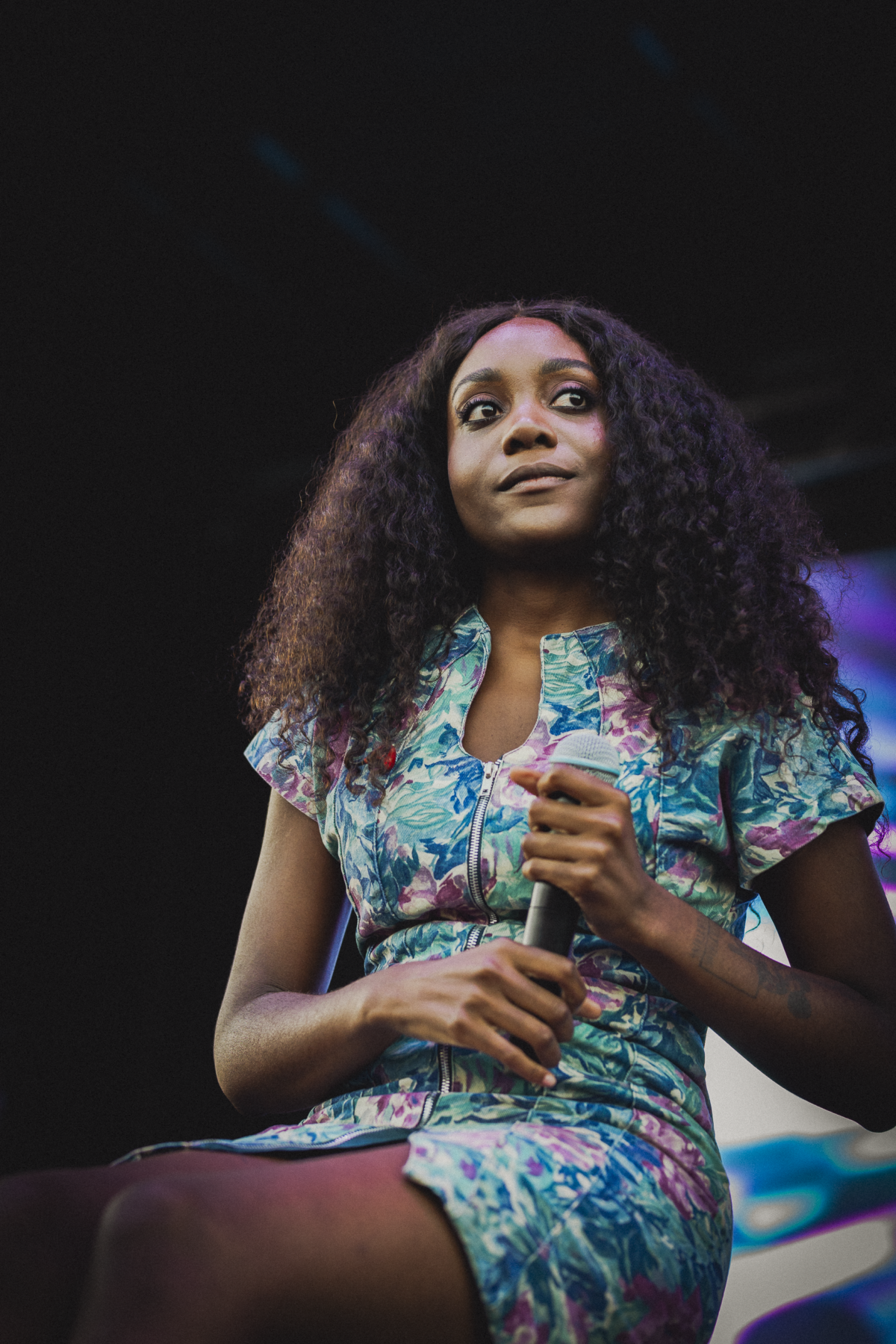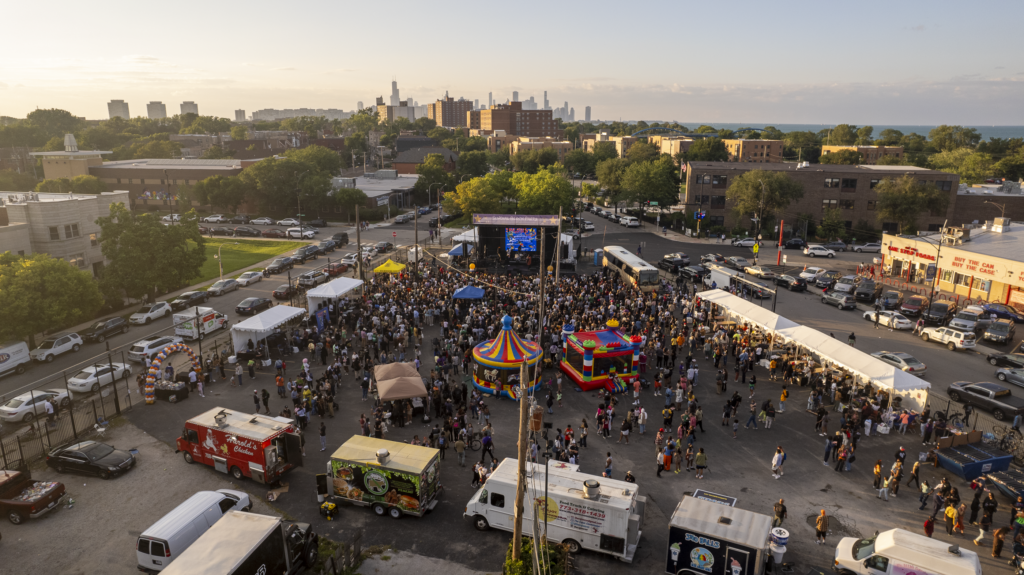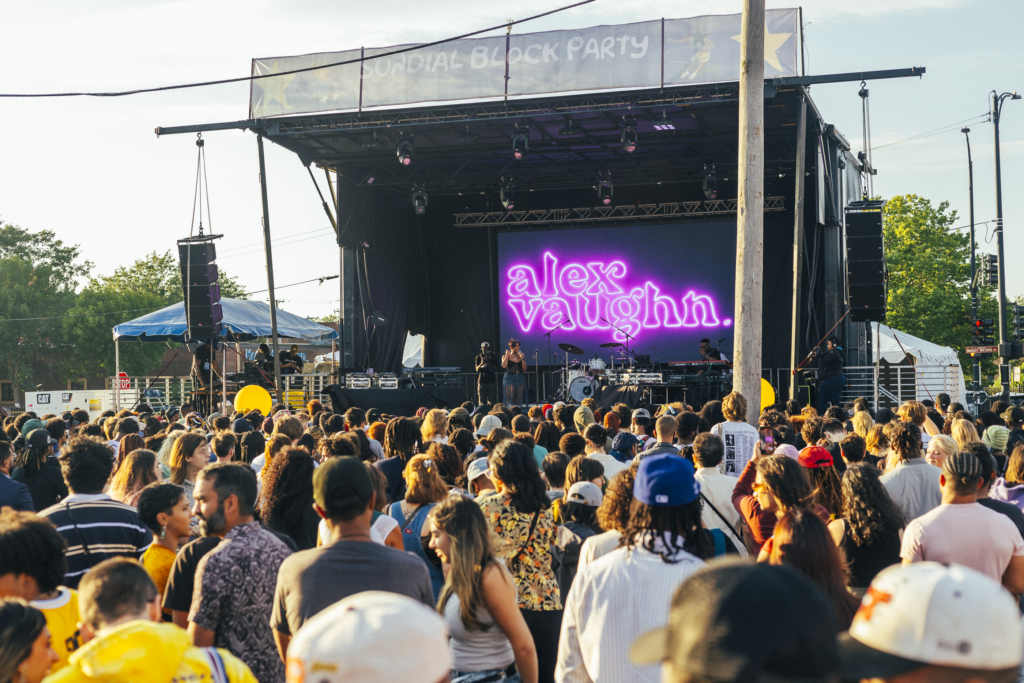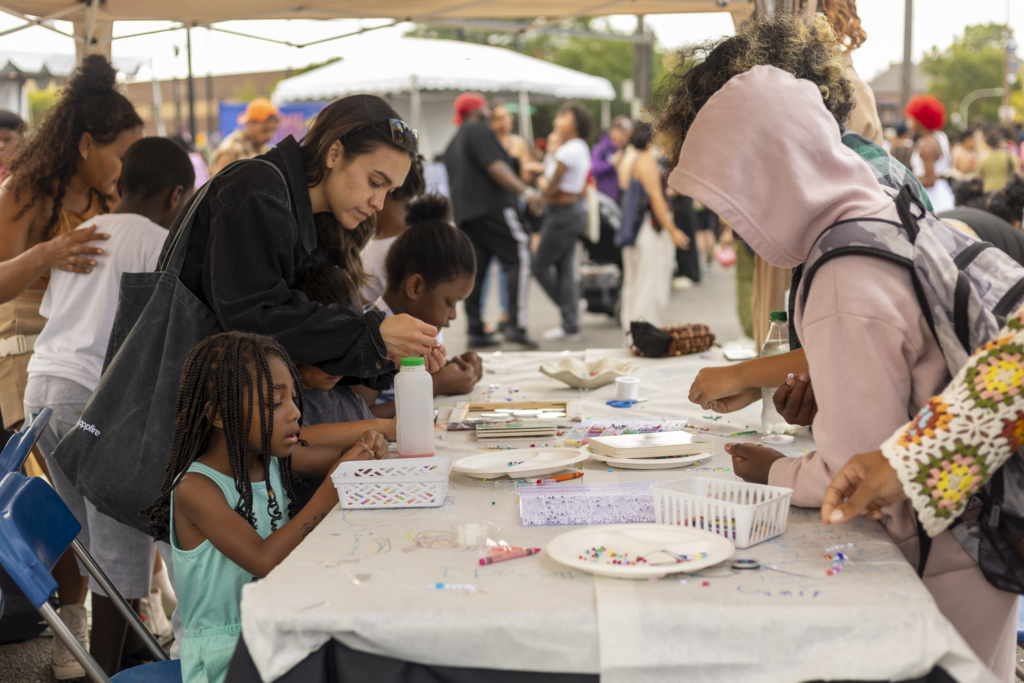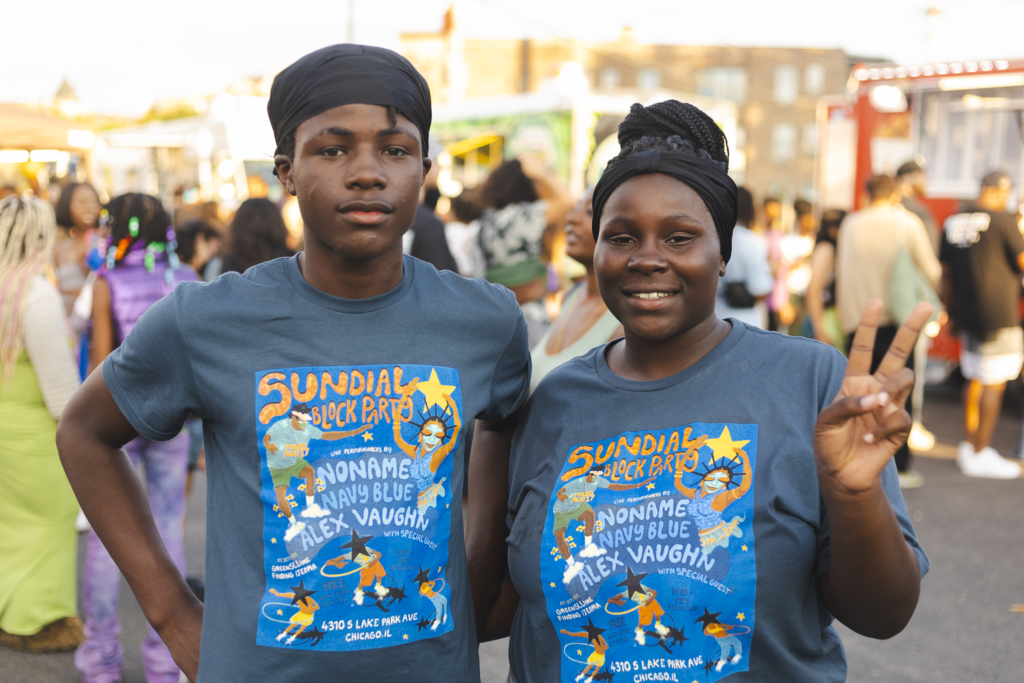Last Thursday, more than two thousand Chicagoans flooded a parking lot on the corner of 43rd Street and Lake Park Avenue for a neighborhood block party celebrating the release of Noname’s long-awaited album, Sundial.
Chicagoan and rapper Fatimah Warner, known to many by Noname, independently organized, threw, and largely funded the Sundial Block Party, which took place blocks away from where she grew up in Kenwood. Warner pulled it off in just thirty days with the help of her mom Desiree Sanders and event organizer Allyson Scrutchens.
“It had been five years since her last project, and she wanted to do something unique around the rollout of it and something involving her fan base and community,” Sanders said.
Since releasing her last album, Room 25, in 2018, Warner left Chicago for Los Angeles and diverted her focus from music to developing her Black-led worker cooperative Noname Book Club. Founded by the rapper in 2019, the cooperative connects community members inside and outside carceral facilities with radical books written by Black, Indigenous and other people of color.
But to the delight of many fans and Chicagoans, her commitment to maintaining and growing Noname Book Club did not prevent Warner from eventually returning to music. After several years of waiting for new music from the rapper, Noname fans were treated to the album drop for Sundial on August 11, prompting a summertime celebration that would tie together her love of music, activism, and the South Side.
The block party brought out Black and Brown people from across Chicago and beyond for music, food, and radical joy. Warner’s idea for the block party came out of a discussion with her mom about how nice it would be to throw an event for her upcoming album on their old block in Kenwood.
It was implausible to throw the block party at the exact street on which Warner had grown up—it was too residential. However, her mom remembered that several blocks away was the mural on which Warner is featured along with other influential South Side musicians like Chance the Rapper and Muddy Waters. She recalled seeing several blues musicians performing in a large parking lot on the day of the mural unveiling.
“One of the managers who I got to meet [at the mural unveiling] was telling me how he’s very proud of my daughter … and if I ever needed anything, just always reach out,” Sanders explained. “I said, ‘Let me take someone up on that offer and reach out.’ I reached out, and they asked, ‘What does she have in mind? What does she want to do?’”
Once they got approval, Noname, Sanders, and Scrutchens orchestrated the event through numerous phone calls, utilizing all available resources to bring Noname’s vision to life.
“Her vision was to organically bring back what community represents through the act of a block party,” Sanders said. “People coming out having food, fun, fellowship, something for the children, fun games, face painting. But also live entertainment.”
Despite Noname’s notoriety in both musical and radical spaces, the DIY feel radiated through the celebration as it would with any neighborhood gathering, with attendees welcoming each other with familiarity and warmth. Warner wandered through the crowd to greet people and to enjoy the sets preceding her own.
Sundial Block Party attendees beamed as they entered the event, dropped off their book donations and joined the festivities. Everyone was taken care of: children were captivated by the two bouncy houses and craft area; adults watched artists’ sets and grabbed meals from a variety of local food trucks like Harold’s Chicken and Whadda Jerk; two horses named Calypso and Django drew attention and excitement from the crowd.
Anyone twenty-one and older could even stop by Black-owned cannabis vendors like Vic Mensa’s 93 Boyz or hop on the Sesh Bus to smoke with people on board.
“To see it be an intergenerational event, from the babies to the elders, was what we wanted,” Sanders said. “Because a lot of times, we do not interact. And so there are a lot of misconceptions and miscommunications and misalignment. But when we realize we have more in common than we have differences, and we can unite around our commonality. That is what she wanted to have. That was her vision.”
Warner incorporated her interest in literacy and radical activism by making the event free to attend with a suggested donation of Toni Morrison’s Sula, George Jackson’s Blood in My Eye, or other books by Black authors to build up the volume of books available for incarcerated Noname Book Club members.
Verlean Singletary, owner of Da Book Joint, a Bronzeville-based book store, was also in attendance, selling books by Black authors that could be donated or taken home. Singletary got involved with the event because she hosts Chicago chapter Noname Book Club meetings at her store.
“This event made me proud to be a Chicagoan and see one of ours come back and sow into her community,” Singletary said. “Noname knows the importance of literacy and ensures that she conveys that message to her community and provides the resources.”
The literary aspect of the block party drew longtime fans of Warner’s activist work, like Madisyn Burke and Nubia Cortez, who are passionate about the power of community outreach.
“Her being from Chicago and realizing that reading is fundamental and especially [that] incarcerated people need books while in jail is a great idea. I just wanted to be here for it,” Burke said.
From the food to the artists involved, every detail was deliberately thought out, making the event all the more cohesive and harmonious.
“[Warner] is an excellent curator of events, in terms of art and intersectionality of intellectuals, and, you know, free thinkers … She has friends and associates in all those spaces,” Sanders said.
Warner reached out to numerous organizations like Sistas in the Village, Mental Health Meets Hip-Hop, and the Final 5 Campaign to set up booths to hand out literature, raise awareness for their work, and share in the community of the day.
Agrnan Hernandez of the Final 5 Campaign, an organization dedicated to the closure of the final five youth prisons in Illinois, wanted to use the block party as a chance to build connections with other people and organizations. As a recently incarcerated youth, Hernandez sees himself as a voice for the organization. He feels that the community can help reach the goal of making Chicago a better place, rid of the juvenile correctional system.
Rapper and activist J. Bambii hosted performances, transitioning between the sets from Navy Blue, Alex Vaughn, DJ GreenSllime, FINDING IJEOMA, and Noname herself, who brought out Common for a surprise performance. The Grammy-award-winning rapper first joined Noname on stage for his feature on their new song, “oblivion,” but later returned at the end of the show for his own set to a vibrant crowd.
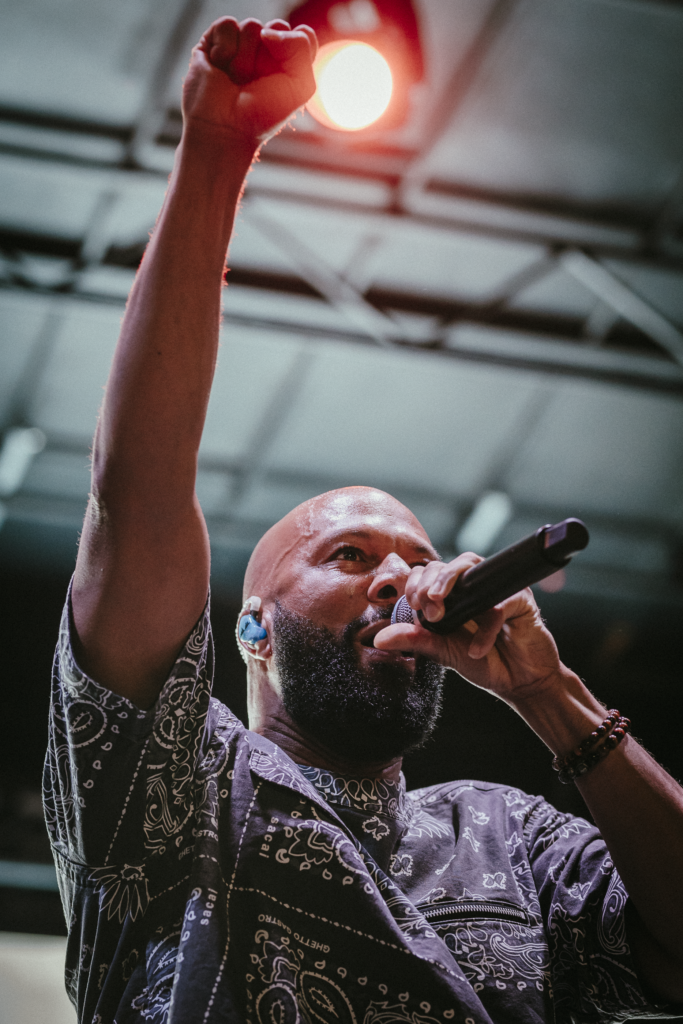
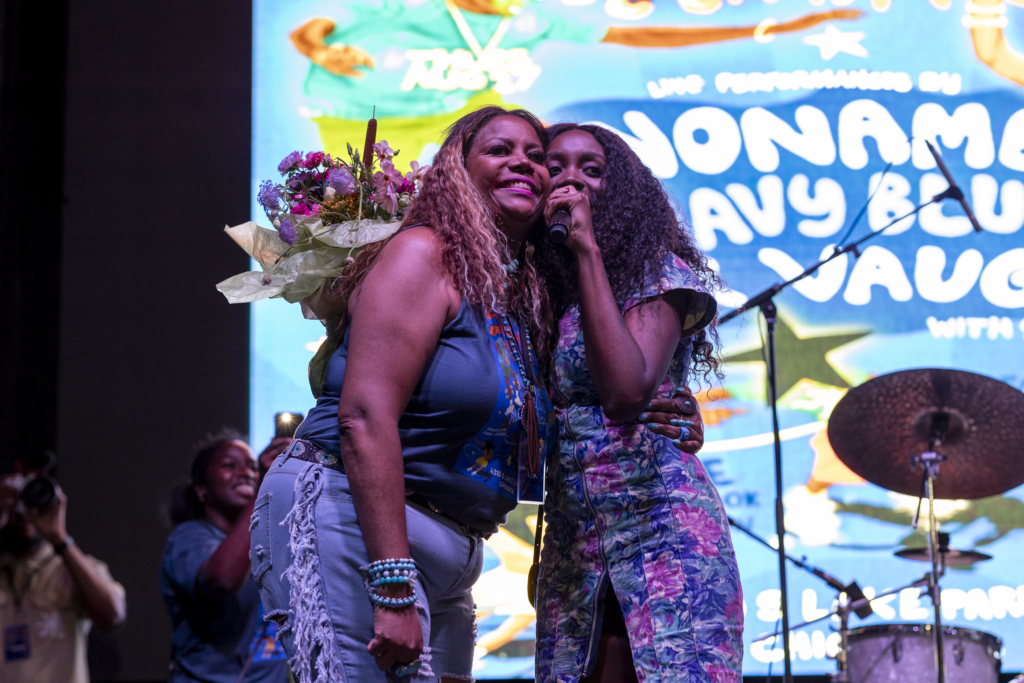
An artist and curator who performs as a DJ under the name FINDING IJEOMA, Alexandria Eregbu was the first to spin that afternoon. She said Warner reached out to her to perform at the Sundial Block Party because of Eregbu’s work at the intersections of art, music and justice.
“I’m really just celebrating my brand, but also this proudness of being Black and celebrating the community and the culture.”
While the day started rainy and cold, she echoed others’ sentiments of the positivity of the celebration and its communal spirit.
“The sun came out, I believe, just for us,” Eregbu said. “The energy has been very fresh, innocent, and youthful. Very unapologetically confident. This sense of gratitude is circulating.”
As the evening began to wrap up, the bins of books at the entrance spilled over with both requested works and other books by Black authors. The wind died down and much of the crowd congregated toward the stage to dance to Noname and Common. Joy radiated from everyone in the crowd.
“It meant everything,” Sanders said. “It meant that we are a village and we are all connected. We’re like the five digits on a hand; they work better together, not separately.”
Toward the end of her set, Warner spoke to the crowd and reflected on the day and her hopes for the event.
“I tried to have this event be representative of all the things I love, so I hope that’s been represented,” she said.
Warner’s clear vision of what she wanted was apparent in every detail, and as her mom affectionately explained, “the universe conspired to make it happen.”
Kelli J. Smith is a writer, editor, and fact-checker. This is her first piece for The Weekly.



